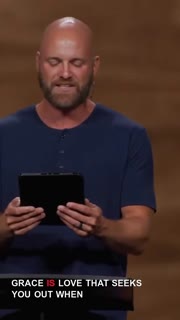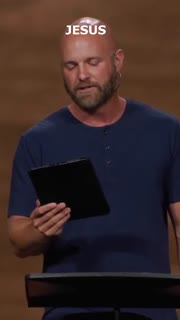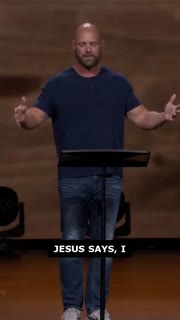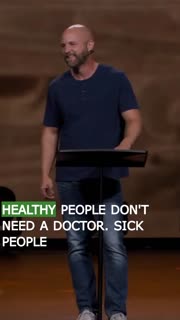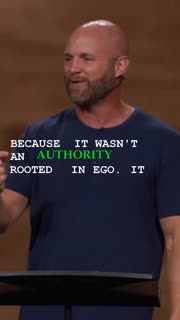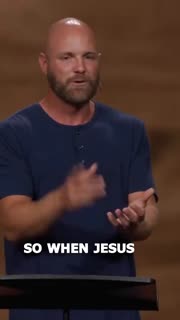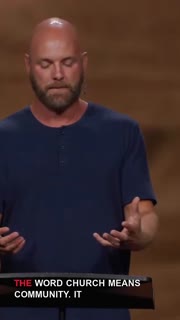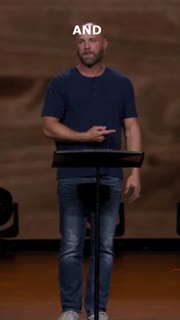Church as a Sanctuary for the Broken
Devotional
Sermon Summary
Bible Study Guide
Sermon Clips
### Quotes for Outreach
1. "I want to be part of a church of blood-stained pews. I want to be a part of a church where the broken and hurting and lost can come and find grace and truth to set them free and then join God's mission of fighting against evil to save people through the power of Jesus." [29:48] (14 seconds)
2. "Grace is love that seeks you out when you have nothing to give in return. Grace is love coming at you that has nothing to do with you. Grace is being loved when you are unlovable. It's why Tim Keller used to put it this way. You are more wicked than you dared imagine, but more loved than you dared dream." [45:09] (17 seconds)
3. "Jesus came to liberate us from the waste of grace. From the weight of having to make it on our own. From the demand to measure up. He came to emancipate us from the burden to get it all right. From the obligation to fix ourselves, find ourselves, and free ourselves." [45:09] (13 seconds)
4. "Jesus says, I came for sick people. You know, there's a certain group of people in our world who are scientifically proven to be the most or some say the worst. Sick people in the world. I don't know if you know this or have seen this data. They're called husbands." [41:05] (19 seconds)
5. "Jesus says, healthy people don't need a doctor. Sick people do. Jesus kept it obvious here, right? Like, thank you for that insight, Jesus. But if you work in an emergency room and you have somebody in there and say, why are you here? And they say, well, I just need my yearly physical. And another person who says, I have a stab wound, it's obvious which one you're going to help." [40:27] (22 seconds)
### Quotes for Members
1. "Because it wasn't an authority rooted in ego. It was an authority rooted in identity. He was so sure of who he was and whose he was that he could speak the gospel with a boldness that was unique. And I said, I want to learn from that guy. I want to be like that guy." [23:32] (18 seconds)
2. "So when Jesus says the gates of hell will not prevail against my church, he's not saying the church is passively sitting back under attack. He's saying the church is the one on attack. The church is attacking hell. We're attacking it. And it's most vulnerable part. And we're going to find the wounded and bleeding and save them." [31:16] (20 seconds)
3. "The word church means community. It means coming together. But in this generation, where we have fake community, and filtered community, and more isolation than ever, I want to speak to the longing in your soul to be connected. The longing in your soul to be known. It is not good for man to be alone. We want you in community. More importantly, God wants you in community." [32:28] (30 seconds)
4. "And here's the reality is for every one of us, somebody could say to us, you're out of here. I think a lot of us feel that in church, that if people knew my story or my past or my secret, what I did last night, the fight I had this week, how lazy I am, how manipulative I am, how much just not who I want to be. They look at me and they say, you're out of here. And Jesus says, no, no, no, no, no, no. I came for you." [42:26] (30 seconds)
5. "One of the reasons I need church is to be reminded I'm not the only one, where I can be part of a journey called spiritual formation where God is slowly making me into the man he wants me to be. So I journey with others called the church. And they encourage me. They laugh with me. They call me out. They encourage everything they can. And they help me along so we can do God's mission together." [52:26] (33 seconds)
Ask a question about this sermon
1. "I want to be part of a church of blood-stained pews. I want to be a part of a church where the broken and hurting and lost can come and find grace and truth to set them free and then join God's mission of fighting against evil to save people through the power of Jesus." [29:48] (14 seconds)
2. "Grace is love that seeks you out when you have nothing to give in return. Grace is love coming at you that has nothing to do with you. Grace is being loved when you are unlovable. It's why Tim Keller used to put it this way. You are more wicked than you dared imagine, but more loved than you dared dream." [45:09] (17 seconds)
3. "Jesus came to liberate us from the waste of grace. From the weight of having to make it on our own. From the demand to measure up. He came to emancipate us from the burden to get it all right. From the obligation to fix ourselves, find ourselves, and free ourselves." [45:09] (13 seconds)
4. "Jesus says, I came for sick people. You know, there's a certain group of people in our world who are scientifically proven to be the most or some say the worst. Sick people in the world. I don't know if you know this or have seen this data. They're called husbands." [41:05] (19 seconds)
5. "Jesus says, healthy people don't need a doctor. Sick people do. Jesus kept it obvious here, right? Like, thank you for that insight, Jesus. But if you work in an emergency room and you have somebody in there and say, why are you here? And they say, well, I just need my yearly physical. And another person who says, I have a stab wound, it's obvious which one you're going to help." [40:27] (22 seconds)
### Quotes for Members
1. "Because it wasn't an authority rooted in ego. It was an authority rooted in identity. He was so sure of who he was and whose he was that he could speak the gospel with a boldness that was unique. And I said, I want to learn from that guy. I want to be like that guy." [23:32] (18 seconds)
2. "So when Jesus says the gates of hell will not prevail against my church, he's not saying the church is passively sitting back under attack. He's saying the church is the one on attack. The church is attacking hell. We're attacking it. And it's most vulnerable part. And we're going to find the wounded and bleeding and save them." [31:16] (20 seconds)
3. "The word church means community. It means coming together. But in this generation, where we have fake community, and filtered community, and more isolation than ever, I want to speak to the longing in your soul to be connected. The longing in your soul to be known. It is not good for man to be alone. We want you in community. More importantly, God wants you in community." [32:28] (30 seconds)
4. "And here's the reality is for every one of us, somebody could say to us, you're out of here. I think a lot of us feel that in church, that if people knew my story or my past or my secret, what I did last night, the fight I had this week, how lazy I am, how manipulative I am, how much just not who I want to be. They look at me and they say, you're out of here. And Jesus says, no, no, no, no, no, no. I came for you." [42:26] (30 seconds)
5. "One of the reasons I need church is to be reminded I'm not the only one, where I can be part of a journey called spiritual formation where God is slowly making me into the man he wants me to be. So I journey with others called the church. And they encourage me. They laugh with me. They call me out. They encourage everything they can. And they help me along so we can do God's mission together." [52:26] (33 seconds)

